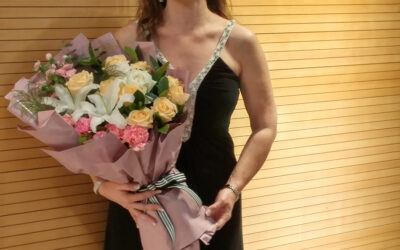The salon space, sharing music and ideas with friends, is my most comfortable and exciting place to be. It is a great space to start friendships and build memories that matter, even years later. Producing salon gatherings creates opportunities to share in ways that can become an exceptionally rewarding part of our day-to-day lives. In this modern world of social media and throwaway fashion, there is something authentic and meaningful about gathering in small groups and sharing talents and inspiration. They knew this in the 18th century, and that timeline flows right through to you and I establishing the neo-salon movement together now.
I have been industriously producing and performing salon events across the country for a few years and see it growing. In the hall, bar or home, good folks like you and I can work together, gathering people in a casual and fashionable way, to share ideas, music, libations, style and our tender humanity.
For a salon to happen, all you need is space, music and people. You can enjoy modern music or perform the classics. There is an incredible amount of music written in the 18th century that doesn’t get performed today and deserves to be performed and heard. No matter what sort of salon you host, I encourage you to join the neo-salon movement with me and schedule an event of your own. Together we can gather to make the mundane magical, as humans always have.
What is the Salon Movement?
The salon movement in music refers to a cultural phenomenon that emerged in the 19th century, particularly in Europe. Salons were gatherings hosted by affluent individuals, often women from the upper classes, in their homes. These gatherings provided a platform for intellectuals, artists, musicians, and other cultural figures to socialize, exchange ideas, and showcase their talents in an intimate setting.
In the context of music, salon music typically refers to small-scale compositions designed for performance in these domestic settings. Composers of salon music crafted pieces that were melodious, charming, and easily accessible to amateur musicians and their audiences. These compositions were often written for solo piano or small chamber ensembles and encompassed genres such as character pieces, nocturnes, waltzes, polonaises, mazurkas, and other dance forms.
Prominent composers associated with the salon movement include Frédéric Chopin, Franz Liszt, Clara Schumann, Fanny Mendelssohn, and Johannes Brahms, among others. Numerous works were specifically composed for salon performance, catering to the tastes and preferences of the salon culture of their time.
The salon movement played a significant role in the democratization of music during the 19th century, as it provided a platform for both established and emerging composers to reach a wider audience beyond the concert hall. Additionally, salons facilitated the exchange of artistic ideas and contributed to the cultural and intellectual vibrancy of the period.
Why is the Salon Movement important for today?
Intimacy and Connection: In an era characterized by digital communication and virtual interactions, the concept of intimate gatherings where people come together to share music and ideas holds significant appeal. The Salon Movement reminds us of the importance of human connection, community, and face-to-face interaction in the appreciation and enjoyment of art.
Exploration of Musical Styles: Salon music encompassed a wide range of genres and styles, reflecting the diversity of musical expression during the 19th century. By exploring these compositions, musicians and audiences today can discover lesser-known works, expand their musical horizons, and appreciate the richness and complexity of music from this period and of music being composed today in this genre.
DIY Culture: The Salon Movement exemplifies a DIY (do-it-yourself) ethos, with amateur musicians actively participating in the performance and appreciation of music. This aspect resonates with contemporary movements promoting amateur music-making, community music projects, and the creation of informal performance spaces.
Accessibility of Music: The Salon Movement has a pivotal role in making music more accessible to a wider audience. Composers wrote pieces specifically for performance in intimate settings, catering to amateur musicians and listeners who might not have access to formal concert halls or extensive musical training. This emphasis on accessibility resonates with contemporary efforts to democratize music and make it inclusive for people from diverse backgrounds.
How could I host a musical salon at my home?
Hosting a musical salon at your home can be a delightful and enriching experience. Here’s a step-by-step guide to help you organize and host a successful event:
Define the Theme or Focus: Decide on the theme or focus of your salon. It could be centered around a specific composer, genre, historical period, or even a particular instrument. Having a theme will help guide your selection of music and create coherence for the event.
Select Performers: Reach out to friends, family, or local musicians who are interested in performing at your salon. Consider inviting both amateur and professional musicians to create a diverse and inclusive atmosphere. Make sure to confirm their availability well in advance and discuss the repertoire they plan to perform.
Prepare the Space: Set up your home to accommodate the salon gathering. Arrange seating in a comfortable and intimate setting, ensuring that everyone has a good view of the performers. Consider dimming the lights slightly to create a cozy ambiance and designate a performance area where musicians can showcase their talents.
Promote the Event: Spread the word about your salon through invitations, social media, or word of mouth. Clearly communicate the date, time, location, and theme of the event, as well as any special instructions for attendees (e.g., BYOB, potluck dinner, suggested attire).
Curate the Repertoire: Work with the performers to curate a diverse repertoire that aligns with the theme of your salon. Encourage them to select pieces that showcase their talents and resonate with the audience. Consider including a mix of solo performances, duets, and ensemble pieces to keep the program engaging.
Provide Refreshments: Offer light refreshments such as finger foods, wine, or non-alcoholic beverages to enhance the social aspect of the salon. You can either prepare the refreshments yourself or ask guests to contribute to a potluck-style gathering.
Create a Welcoming Atmosphere: Greet guests as they arrive and introduce them to each other to foster a sense of community. Encourage mingling and conversation before the performances begin, allowing guests to get to know each other and share their enthusiasm for music.
Facilitate the Performances: As the host, you’ll play a crucial role in facilitating the performances. Introduce each performer and provide some context about the pieces they’ll be playing. Encourage applause and appreciation from the audience after each performance, creating a supportive and encouraging environment for the musicians.
Express Gratitude: At the end of the salon, thank your guests and performers for attending and contributing to the event. Express your appreciation for their support and enthusiasm, and encourage them to stay connected for future gatherings.
By following these steps, you can create a memorable and enjoyable musical salon experience for yourself and your guests, fostering a sense of community and appreciation for the beauty of music in the comfort of your own home.





